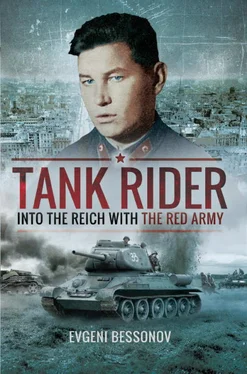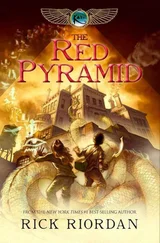Twilight set in and firing ceased from both sides. It was just about time to get some food. War was war, but we were hungry anyway. Soldiers were sent out to look for food and they found a small warehouse with supplies and vodka. We had a nice meal: we had a little vodka and finished off all the canned food. Shortly before morning a liaison arrived from company commander Titov with a note. In the note he gave us an order to move along the left side of the street and to join the third platoon of the company, which was leaderless, as Gavrilov was wounded. An order was order, and under cover of darkness Shakulo and I crossed the street and joined the third platoon. The machine-gun platoon of the company accompanied us, under Lieutenant Kolosov. Soldiers from Gavrilov’s platoon were distributed between our two companies on the order of the company commander. We tried to advance during the night, but in the dark we ran into the area of responsibility of the 2nd company of our battalion, so we had to move to the side of them. We ran into some Germans in the process, and the leader of the vanguard squad was wounded in the stomach. Our advance halted. It was good that the whole thing happened in darkness and the enemy could not deliver well-directed fire. However, we suffered casualties and were forced to stop and consolidate our lines. We did not dare to attack further – a German tank arrived and opened fire with machine-guns.
In the morning an orderly soldier passed on the order from the company commander to abandon the area, make way for the 2nd company, consolidate defences at the previous position and to continue attacking under cover of darkness, advancing to the outskirts of the town. It was a hard day for us – a Tiger was methodically firing its main gun at the building where we were stationed.
German snipers arrived on the scene. My soldiers tracked down one of them – he was firing from a window of a high house. Shakulo’s platoon had a Soviet-made sniper rifle. I got a commission to get the guy (I used to train snipers in both male and female companies). I was looking out for him for a long time and when his head popped up in the window, fired a round. Soldiers, who were observing our duel through binoculars, told me that I got him. The German never popped up again.
Besides this, the Germans tried to counterattack, but were thrown back with casualties from machine-gun fire. During the night Shakulo and I bypassed the church square without encountering the enemy and consolidated our positions in wooden barns and huts in the outskirts. In the morning the Germans spotted us and opened machine-gun fire. Snipers were also there, setting the huts with soldiers on fire. We had to move to a safer place. In the daytime the enemy tried to attack again, but our riflemen repelled that assault as well. As twilight descended, we left the charred ruins and took up position in a strong brick building, also in the town’s outskirts. As we learned later, Gestapo secret police had been stationed in that building during the occupation. In the cellar of the building we found honey, spirits and some other food staples.
During the day the enemy tried to attack again, not from the city, but from the opposite direction, from the open field. Our soldiers prepared to fire from windows. The Germans arrived on three or four trucks, dismounted and formed an attacking line some 600 to 800 metres from us. It was good that they had no tanks with them. We allowed them to approach us and wiped them off the face of the earth, using two Maxim heavy machine-guns. The fire strike on them was unexpected, heavy, but short – we were saving ammo. At the same time the Germans started to run across the street, concentrating for an attack from the centre of the city, not far from our building. There was a soldier with a sniper rifle in Shakulo’s platoon and he opened fire on the running German soldiers. He was quite successful, the distance was less than 100 metres, and he got so many of them that the Germans first stopped running and then totally abandoned the area. A single sniper destroyed the attack.
In the evening an orderly came running from Titov with a written order. In his note the company commander ordered us to return to the former position and occupy that house ‘with a Tiger by the wall’. We fulfilled the order, and Shakulo went to see the company commander to report the situation on Kolosov’s and my behalf. At that time, as we learnt later, four more Tigers entered the city. Lieutenant Shakulo reported everything to Titov, as well as informing him that to the right of the main street there was only our company, while to the left there were two full companies of the battalion, as well as the entire 2nd battalion of the Brigade. If our company departed, the Germans would be able to occupy the houses to the right of the road and end up in the Brigade’s rear. Titov left us alone and did not bother us any more.
In general, I think he should have arrived at the battlefield and seen the situation for himself instead of just sending notes to us. On the other hand, I should mention Titov’s personal bravery. One sunny day a German tank rolled down the main street past our house, moving into our rear. It did not make it far – the company commander, Senior Lieutenant Petr Ivanovich Titov, blew it up. He burnt the tank with a single petrol bomb, which he threw from behind a house corner. For this heroic deed Titov was awarded with Order of Great Patriotic War 2nd Degree.
Blocks on our side of the street were practically freed from the enemy. The Germans only put up resistance to the left of the main road, where brigade units were still in action. Suddenly an orderly, who was going to our company commander, reported that in the rear of our company, behind our house there were three or four Tiger tanks. Apparently, they had driven through another street and arrived in our rear, controlling the main street. Quite a nasty surprise! It was good that they had no infantry with them. We sent the runner to the other street to report to the company commander and ask what to do. An order came – to stay where we were. So we did.
Of course, it was mostly the enemy’s armour that prevented us from seizing the town of Skalat, although they had just some eight or ten tanks. The brigade had almost no weapons that would be effective against heavy tanks: we did not have anti-tank grenades, although they were anyway inefficient against the Tigers; we had very few petrol bombs that could be used. The Tigers grew so bold that they drove around town like chickens hanging around in a village, and only after Titov had burnt one Tiger did they become more cautious and stopped acting so boldly.
After a day or two some of our tanks from another unit arrived, accompanied by the regiment of Katyushas (BM-13), which had been able to overcome the mud on the roads. That regiment inflicted casualties on our Brigade. The regiment showered its fire not only on the enemy, but also on the 2nd battalion and the 3rd company of our battalion, which for some reason was in trenches in the field, outside the city, unlike our company. Apparently, they could not break through into the city, while Shakulo and I were lucky. A single salvo killed 30 to 35 soldiers. In one month of fighting we did not have such high casualties, as from one Katyusha salvo! It was painful to see the dead soldiers – young, healthy and needed for further battles. It hurt even more that they died from friendly fire, because of the carelessness of some commanders for the lives of soldiers, and their incompetence and lack of leadership skills. The worst part was that none of the commanders that allowed this to happen were punished. This salvo could have helped the Germans, who could have mounted an attack after it. However, the arrival of Katyushas and tanks forced the enemy to leave the town at night and on 20 March, 1944, the town of Skalat was fully liberated.
Читать дальше












